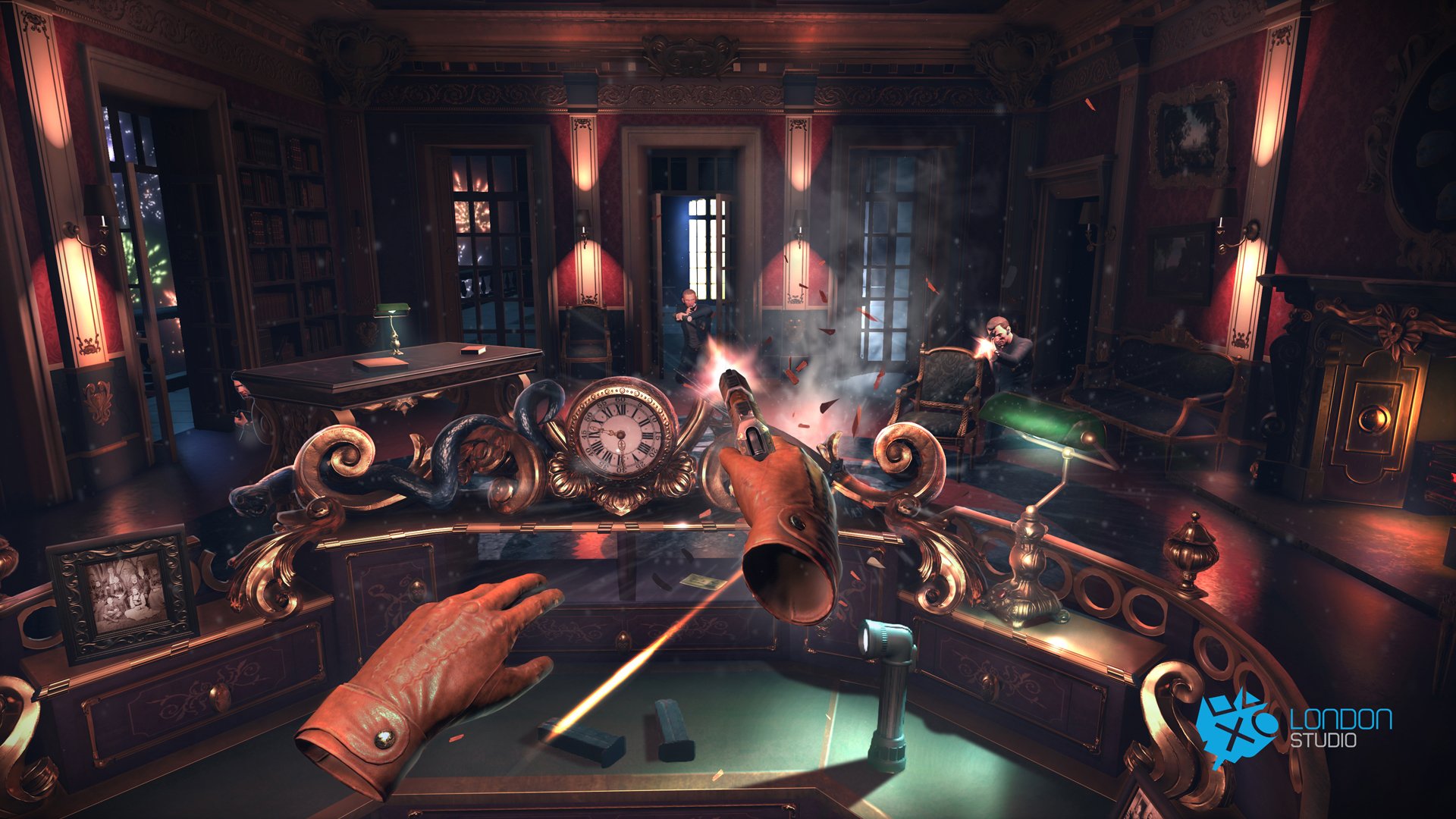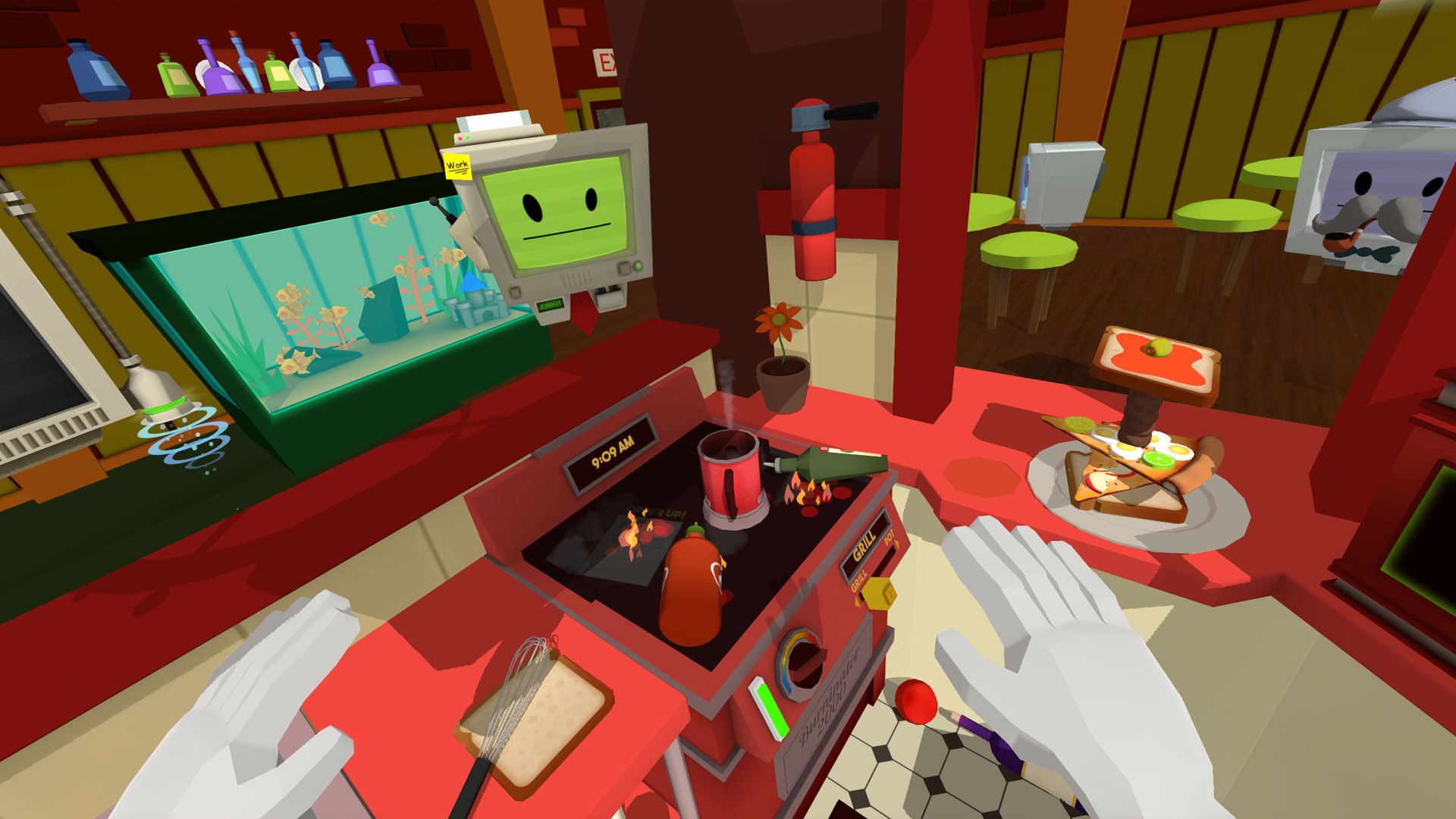Goofing off is one of the greatest things you can do in VR
It's been years, but I still remember those watermelons like it was yesterday. Maybe you know the ones: strewn throughout Siberia, the first level in the legendary FPS TimeSplitters 2. There was no logical explanation for dozens of uncut watermelons sitting on shelves in a research lab-turned-military outpost, nor did they serve any gameplay function like restoring your health. They simply existed to amuse players like myself - those who would delight in shooting the watermelons just to see how they would react to gunfire, or kicking them around the map in a time when basic 3D physics could still impress. These kinds of functionally useless, far from worthless items exist in plenty of games: more watermelons in Metal Gear Rising, for instance, or the soccer and beach balls inexplicably present in Destiny's Tower. And the pursuit of self-satisfying enjoyment from non-essential bits of your environment is going to be incredibly meaningful in the era of VR gaming.
I first got the idea to do something really stupid in VR during The London Heist, one of the earliest PlayStation VR demos that's now one of the mains draws for PlayStation VR Worlds. I was supposed to be ducking down behind a desk, arming myself to the teeth before a pack of angry mobsters showed up to shoot the bejesus out of me. And while the desk contained the pistol and ammunition clips I'd need to succeed, it also housed a pristine, fist-sized diamond that serves no gameplay purpose. What on Earth was it doing there? And more importantly: could I throw it in the air, repeatedly, as if I was the world's richest, most irresponsible circus performer? Why yes - yes I could, juggling the invaluable crystal between my virtual hands as the twin Move controllers responded to catching its heft with a satisfying twitch. Even as the first few goons started to trickle into the room, I was still totally occupied with this virtual diamond, perfectly content to chuck it into the air and try to catch it rather than fire back at a VR shooting gallery. Eventually, I opted to use the diamond as a deadly projectile, chucking it at the closest thug and missing my attempted blunt-object headshot by several feet. Whoops! Oh well - my idiotic antihero didn't need the money anyway.

Yes, VR's greatest strength is its ability to immerse players in new ways, and fiddling around with bits of the environment during a scripted shootout threatens the realism of the situation (as if our protagonist would be clowning around during a life-or-death scenario). But from a broader perspective, being able to mess about with the diamond, even with you're under a hail of gunfire, enhances immersion like you wouldn't believe. Even if it makes no sense to the narrative, it drives home the feeling that you can do what you want in this world. If that means throwing the diamond like a lethal baseball, or holding your pistol sideways and shooting back 'gangster style', have at it. There's no advantage to these actions, and they may end up getting you killed - but having the freedom to be a cavalier, juggling jewel thief is empowering in its own way. After the demo, I was delighted to hear that testers had taken the juggling concept a step further, bouncing the diamond off the walls and seeing if they could catch it, even behind-the-back. That pursuit, to me, is so much more interesting than striving to flawlessly execute every enemy without taking a hit, even if the latter is the goal that the game is trying to promote.
Fortunately, plenty of VR games encourage you to seek out and play around with unorthodox solutions - and I don't just mean games like Fantastic Contraption, which revolves entirely around solving physics puzzles using machines you build piece-by-piece. Take Job Simulator, a goofy VR museum set in the year 2050, where robots have inherited (and misinterpreted) most forms of labor. It's a game powered by humor, and is all but impossible to fail; instead of restricting you from trying certain combinations, it simply uses the weirdest possibilities as a way to surprise and entertain you. I tried to make the most absurd dishes I could in the Gourmet Chef simulation - pizza topped with an uncooked, unbroken egg, or a milk-carton-and-chicken-wing sandwich - but the game handled these kitchen nightmares with ease, making my customers' satisfaction even funnier.

Creativity doesn't have to be for the sake of comedy, either - it can also be a source of sheer coolness. My most memorable moment in Bullet Train, an intense VR FPS that's every cinematic gunfight fantasy fulfilled, didn't even revolve around a firearm at all. When I realized I could pick up a discarded carton of Chinese food sitting that got tossed on the train, I set out to recreate my favorite Uncharted moment - one that isn't even in the games themselves, but rather an early commercial for the first game. Nathan Drake's sneaking up on a pack of armed henchmen, only to have his cover blown by some walkie-talkie chatter. Unphased, Drake snarkily remarks "Think it's for you!" before tossing the transceiver at the nearest enemy and opening fire in the same instant. Being able to reenact this exceptionally cool move (with the Chinese food in place of a two-way radio) was a hoot, though I probably should've said something like "Did someone order the number 45?!" BAM! BAM! That Chinese food carton was likely put in Bullet Train as a world-building prop first and foremost, but that doesn't mean it can't double as a source of some inventive enjoyment.
While playing VR games, I'm usually driven by the question 'I wonder if the developers thought of trying this thing I'm about to do.' The great part is, they usually have - and because they've anticipated it, that bizarre choice you've made is just another opportunity to impress you. Too often, we're preoccupied with playing games in the most efficient way possible, willing to follow along with the clearest, most obvious ways to progress forward. Maybe we don't even do so consciously - it's just that we know how many games are still sitting on our backlogs, waiting to be experienced, and it just makes sense to take the direct route to a game's conclusion and move on to the next. But I think one of the best things you can do whenever VR enters your life is take the time to stop and smell the digital roses.
Sign up to the GamesRadar+ Newsletter
Weekly digests, tales from the communities you love, and more
Lucas Sullivan is the former US Managing Editor of GamesRadar+. Lucas spent seven years working for GR, starting as an Associate Editor in 2012 before climbing the ranks. He left us in 2019 to pursue a career path on the other side of the fence, joining 2K Games as a Global Content Manager. Lucas doesn't get to write about games like Borderlands and Mafia anymore, but he does get to help make and market them.



